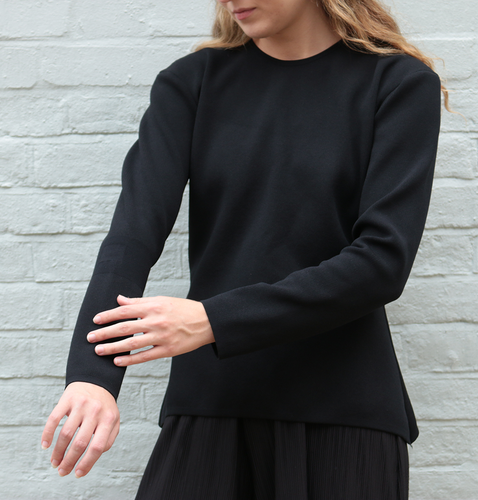
Key details
Date
- 6 October 2021
Author
- RCA
Read time
- 2 minutes
RCA PhD candidate, Helen Hamlyn Centre for Design (HHCD) Research Fellow and Founder & CEO of InnovationRCA start-up KnitRegen Laura Salisbury has been awarded a Future Leaders Fellowship from UKRI (UK Research and Innovation).
Key details
Date
- 6 October 2021
Author
- RCA
Read time
- 2 minutes
The four year fellowship will support further development of Salisbury’s patent pending smart-textiles garments that aid stroke rehabilitation. It will also support the establishment of a research lab at the RCA that will enable further research into medical applications for similar smart-textiles innovations.
Salisbury’s practice-based doctoral research at the RCA resulted in the development of prototypes for textile components of wearable stroke rehabilitation physiotherapy devices.
By combining neuroscience, material science and expertise in technical textiles the garments help users regain upper limb muscle use. Their textile nano structure provides targeted, continuous limb support by modifying neural responses to improve recovery.

Knitregen
UKRI Future Leaders Fellowships are awarded to talented people in universities, businesses, and other research and innovation environments. They support the development of early career researchers, establishing them as a world-leading expert in their respective field, funding their work, team building and training. For Salisbury the Fellowship is enabling two things. Firstly, to continue with the development of the textile components of KnitRegen in order for them to be more widely implemented. Secondly, it will enable the establishment of a research lab, which will support the development of research in smart-textiles and health applications, from research stage through to commercialisation or implementation.
The fellowship involves collaboration from a cross-disciplinary team made up of Dr Rachel Stockley – physiotherapist and senior research fellow at the University of Central Lancashire who has been involved throughout Salisbury’s research in an advisory role, Dr Peter Petrov from the Department of Materials at Imperial College London, and Professor Stuart Baker, Professor of Movement Neuroscience at Newcastle University.

Microscope image of Knitregen yarn specimen
While the science and material technologies are vital components of the device, it is through inclusive and human-centred design methods that the garments have been developed to be both functional and desirable, giving the wearer choice and agency in their treatment and recovery. Throughout her research Salisbury has worked closely with stroke survivors across thirteen London boroughs who she connected with through two charities: Headway and Shoreditch Trust; and she has recently established a further relationship with Different Strokes. This enabled her to develop a device that reflects the needs of stroke survivors and fits in with their lives, improving compliance and the effectiveness of the medical benefits of the devices.
This UKRI Future Leaders Fellowship follows on from Salisbury’s previous successes. KnitRegen was the winner of the Mayor of London's Entrepreneur Programme in the health category. Salisbury has also had support through the MedTech Superconnector and the Henry Royce Institute, which has enabled her to further develop materials and scope wider applications for her design. In 2020 KnitRegen was selected as one of five graduate start-ups to join InnovationRCA, the College’s centre for enterprise, entrepreneurship, incubation and business support, and has attracted seed funding from Venrex Investment Management LLP to develop its first functional garment for brain injury survivors by summer 2022.
“Inclusive design methodologies centre the implications of treatment on people and people’s lives. This design approach enables me to focus on understanding how people behave, who they were before stroke, how they see themselves now and who they want to be. These emotional and behavioural aspects of stroke recovery are vital. Because recovery can take a long time any device or wearable needs to be aligned with this longer term, beyond initial rehabilitation.”
